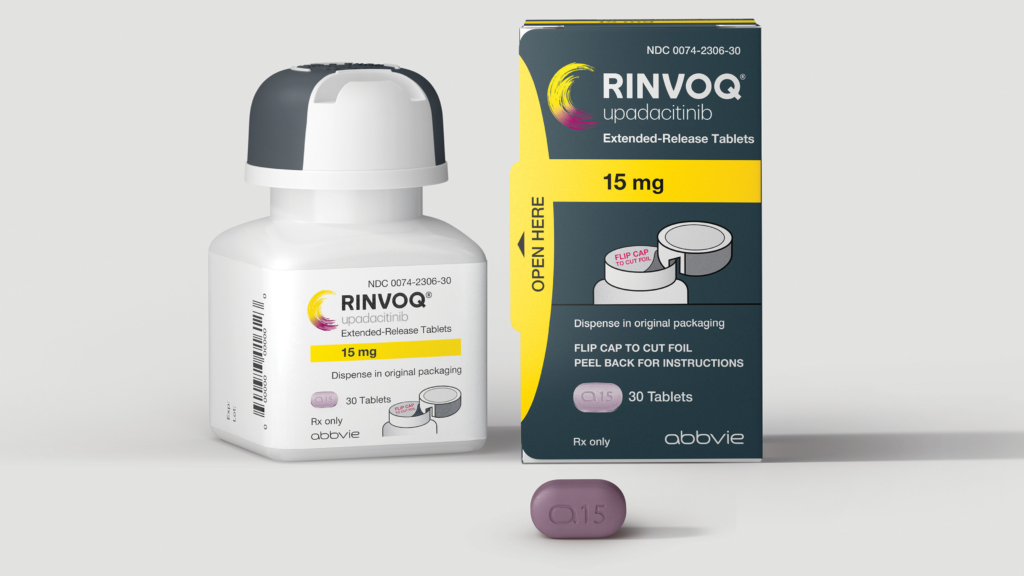Rinvoq received its sixth FDA approval, this time it is for treating adults with non-radiographic axial spondyloarthritis, a form of inflammatory arthritis that affects the spine. Photo courtesy of AbbVie.
Rheumatic diseases include conditions in which the immune system attacks the body, causing inflammation and pain in different joints. They are chronic and progressive, meaning they will worsen over time without proper intervention.
Non-radiographic axial spondyloarthritis (nr-axSpA) falls within the category of rheumatic diseases and is a subtype of a broader condition, axial spondyloarthritis. Nr-axSpA causes back pain and stiffness that greatly impacts the quality of life in those affected. Additionally, about twenty-five percent of patients with nr-axSpA will have their condition progress to ankylosing spondyloarthritis (AS). Over time, AS will cause bones in the spine to fuse, reducing flexibility and worsening posture. The most common treatment for the conditions has been tumor necrosis factor (TNF) blocker therapy, in which the TNF antibodies supress the activity of TNF in the body to reduce inflammation. However, some patients experience intolerance or an inadequate response to the TNF therapy, leaving them without a satisfactory disease management option.
On October 21st, 2022, AbbVie announced in a press release that Rinvoq received its sixth US Food and Drug Administration (FDA) approval, this time it is for treating adults with nr-axSpA with poor response to TNF blocker therapy.
Rinvoq is thus the first and only oral JAK inhibitor approved for adults with nr-axSpA, among other indications across chronic immune diseases, four of which are rheumatic. JAK inhibitors block cell signaling that cause inflammation, providing patients an alternative method to regulating an overactive immune system.
Since there are limited treatment options for the disease, nr-axSpA can greatly impact the quality of patients’ lives as symptoms remain despite treatment.
Cassie Shafer, the CEO of Spondylitis Association of America (SAA), commented that “this approval of Rinvoq is a tremendous step forward in providing our patient community with another option to help them reach their treatment goals, and to find relief.”
Earlier this year, Rinvoq (upadacitinib) was approved by the FDA for treatment of active ankylosing spondylitis in adults who responded poorly to TNF blocker therapy.
XTALKS WEBINAR: Utilizing State-of-the-Art DEL Technology to Discover Compounds that Hit Challenging Therapeutic Targets
Live and On-Demand: Thursday, December 1, 2022, at 11am EST (4pm GMT/UK)
Register for this free webinar to learn about the use of state-of-the-art DNA-encoded small molecule library (DEL) technology to uncover compounds that modulate challenging therapeutic targets.
Rinvoq Efficacy, Safety and Tolerability Assessed in SELECT-AXIS 2 Clinical Trial
The FDA approval of Rinvoq was supported by data generated from the Phase III, randomized, placebo-controlled, double-blind SELECT-AXIS 2 clinical trial, in which the efficacy, safety and tolerability of the medication was investigated in adults with nr-axSpA. The clinical trial consisted of two standalone studies with all aspects of the study conducted independently (e.g., randomization, data collection, analysis) in which Rinvoq was compared to a placebo. One study saw reduction of symptoms in patients with axSpA, and the other with nr-axSpA.
In the studies, the primary endpoint was the percentage of subjects achieving ASAS40 response after 14 weeks of treatment with Rinvoq vs the placebo. ASAS40 is an index used to measure disease activity — to achieve an ASAS40 response, a patient’s disease activity must have improved by at least 40 percent and improved by two units (on a scale of 0 to 10) in at least three of four disease areas assessed, with remaining areas not worsening (e.g., back pain, physical function).
Patients who received Rinvoq were administered 15 mg once daily and at the 14-week timepoint, 44.9 percent of patients achieved ASAS40 response, compared to 22.3 percent of patients receiving placebo. In fact, the ASAS40 response was observed as early as two weeks into treatment with Rinvoq. Other improvements in patients receiving Rinvoq included a decrease from baseline in total back pain and greater improvement in physical function, compared to patients receiving placebo treatment. The safety profile of Rinvoq was also consistent with that in patients with ankylosing spondylitis and rheumatoid and psoriatic arthritis.
Common side effects of Rinvoq include upper respiratory tract infections, shingles, herpes simplex virus infections, nausea, fever and headaches. All patients should contact their health care provider before starting treatment with Rinvoq as there are some serious side effects associated with immune suppressing medications.












Join or login to leave a comment
JOIN LOGIN